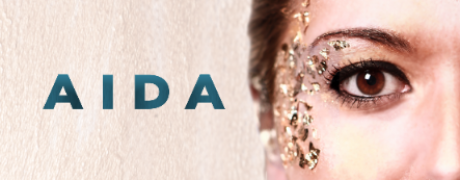
Aida
FRANCES DOCX may not be an Elton fan, but loved this heartfelt, way-less-cringe-than-expected production.

ADC, 13th – 23rd March, 7.45pm, Mon-Wed & mats £10/£8, Thu-Sat £12/£10
Translating opera into musical takes ingenuity; translating Tim Rice and Elton John into something palatable takes balls. And director Atri Banerjee has balls.
The plot, explained to me in a two minute brisk-paced gallop to the ADC, is as follows: Egyptian Captain Radames captures Nubian princess Aida, and falls in love with her. This is problematic because Radames is (reluctantly) already betrothed to Egyptian princess Amneris. Egypt and Nubia are also at war, making the Aida and Radames’ affair even more of a taboo.
You can tell a lot from a song title, I thought, as I pored over the programme informing me that this evening I would be subject to “Every Story Is a Love Story”, “Fortune Favours the Brave” and “Written in the Stars”. This is what I meant by the Elton John effect. It’s okay though, Banerjee’s production seems to have sifted the cringe right out of the score and we are left with something resembling gravitas.
Admittedly, (and probably transparently) I was initially unconvinced by the concept. The first few songs were too Lion-King, the chorus felt like distracting props and I couldn’t work out who anyone was. What was the set? Was it a harp? Was it a nightclub circa 1999?
But my initial impressions soon gave way. From around the third song in, Aida just kept getting better, almost managing to step up with every key change and repeatedly producing the unexpected tonally and visually.
The three principles, Lauren Hutchinson (Aida), Henry Jenkinson (Radames) and Rosalind Peters (Amneris) are perfectly cast, each bringing a new type of grit and passion to the production. The opening notes were hit perfectly by Hutchinson and she sustained her vocal tenacity throughout. If Hutchinson is flawed, it is because she is definitely singing-first acting-second. After stunning the audience with her sheer vocal power and volume, the transition back into dialogue exchange felt synthetic and occasionally inaudible.
Jenkinson, however, lithely slipped between both dimensions with ease. Jenkinson’s voice is elegant and his acting equally so; his ability to weep and sing in simultaneity was astounding. He played his part with perfection and a heartfelt commitment to the plot. Ultimately though, it was Rosalind Peters who left me and, I noticed, several around me, in tears. Peters played Amneris with naturalism and depth. Hutchinson was polished, Jenkinson even better, but it was Peters who brought the real gut-punch with her song “I Know the Truth”. She may not be as refined or sophisticated a singer as the other two but she exposes the weakness and imperfection inherent in the human condition. We appreciated it when Hutchinson sang, but we really felt when Peters did.
Others to mention include Robbie Aird, playing Zoser. No stranger to the Cambridge thespian world, Aird once more delivered grace and majesty to the stage. His song “Like Father, Like Son”, however, felt a little farcical. The fight scene was reminiscent of a play-ground scrap and somewhat fell short of the deep familial rupture it was supposed to portray. However, I partly blame Elton John and Tim Rice for their incongruously optimistic rhythms.
The tech and band were seamless, sunsets were subtly evoked and musical cues hit impeccably. The production surged forward dramatically throughout. The audience were visually treated to glowing globes, luminous diablos and ballet. The vocal texture built up and then stripped itself down again as appropriate. The chorus I earlier dismissed as ‘props’ quickly proved themselves integral to progressing and framing the plot. Every inch of the production has been so beautifully thought about, from the brilliant casting to the aesthetic displays and the musical texture. And finally, Sarah Mercer’s corn rows, too, are great.









































